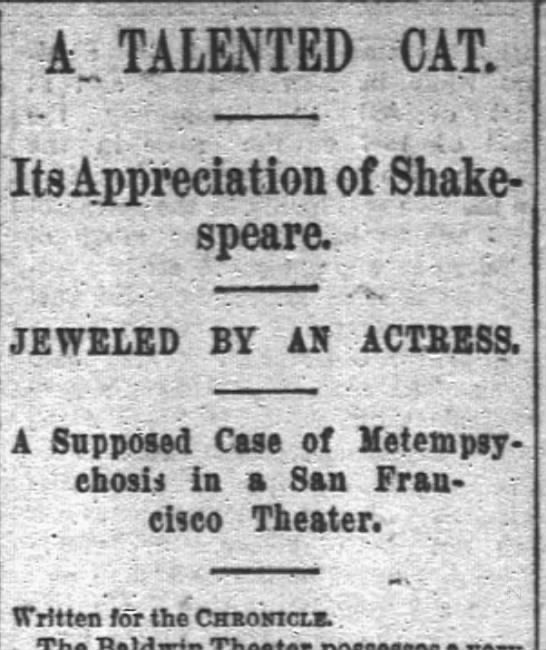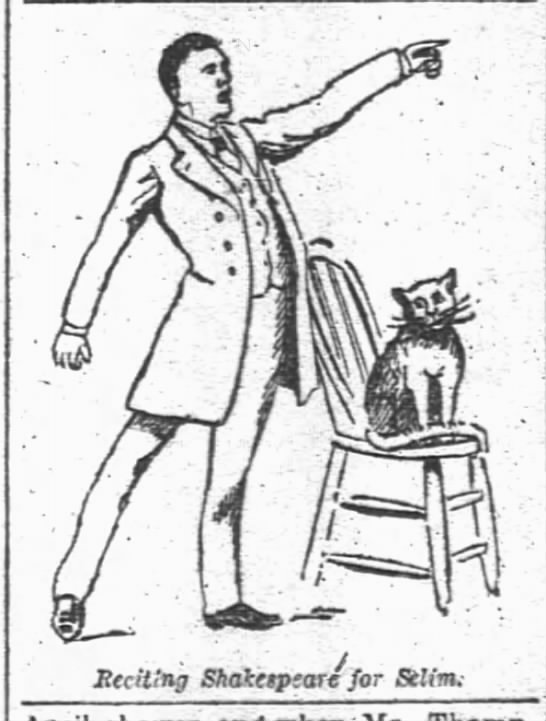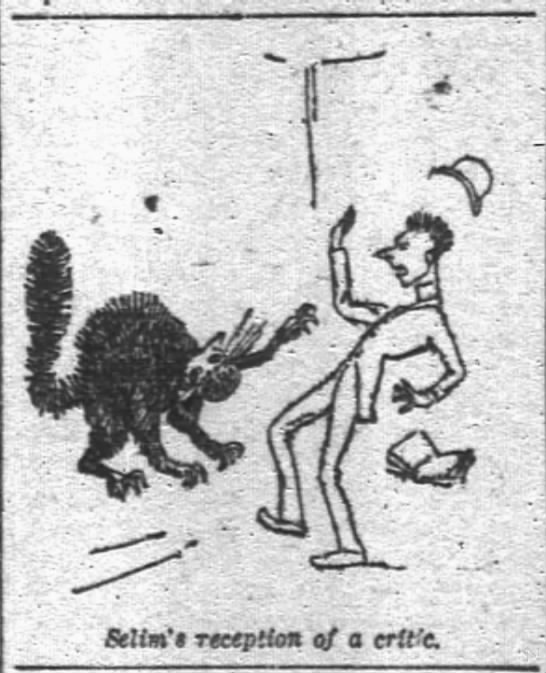 |
| Via Newspapers.com |
A mystical cat who loves beer, enjoys fine dramatic works, and hates the news media. You bet I’m inviting him into the hallowed halls of Strange Company HQ. The “San Francisco Chronicle,” October 13, 1899:
The Baldwin Theater possesses a very peculiar black cat who has probably received more attentions from dramatic celebrities male and female than any member of the feline tribe in the country. Selim is the name of the highly cultivated mouser, the title having been bestowed on him by some discriminating actor who was doubtless impressed by the rather Oriental tastes of the sable pet. Exactly how or when Selim became one of the properties of the theater no one can tell. All at once he sprang into notice and favor as a habitue of the greenroom and the stage and soon made himself as much a feature of the establishment as anything with four legs and a mercurial disposition can possibly be. When the Fanny Davenport combination occupied the theater recently, Selim attracted unusual attention in the greenroom, as there were several confirmed spiritualists in the company who hold the Pythagorean doctrine of the transmigration of souls.
John Thompson, who can Impose spiritual activity into any inanimate object from a doughnut to a chunk of coal, and bring a fusillade of raps out of an ordinary piece of furniture, pronounced Selim at first sight a reanimated actor.
Property Master Marcus, who was listening to Thespian Thompson’s diagnosis, suggested that possibly Selim was the shadow of some snide song and dance man.
“In sooth thou speakest well, good Marcus,” quoth the Thespian, “but we shall soon test the temper of his former dramatic ability,” and forthwith Mr. Thompson hurled at the defenseless cat a chunk of Shakesperian blank verse that would have staggered Joe McAullife if it hit him anywhere within the scope of his intellectuality. Instead of rolling over and dying instantly, the wonderful cat faced the poetic avalanche as calmly as a duck would an April shower, and when Mr. Thompson, at the end of his declamation, fell exhausted and perspiring over the prompter’s table, Selim was as calm as Eve.
“My life upon it,” exclaimed Mr. Thompson as soon as he could collect the remnants of his breath, “Selim was a legitimate actor.”
Selim, who was listening gravely, was plainly seen by Mr. Bouvier to nod his head approvingly, and in the general discussion that followed in the greenroom the conclusions were reached that Selim was certainly the spirit of some eminent actor who once strode the Baldwin stage.
Morris Peyser thought that Selim’s appreciation of tragedy indicated that he might be the ghost of the talented William E. Sheridan, but Master Mechanic Abrahams was ready to make affidavits that the weird feline was none other than Frank Evan Rae, the Beau Brummel of the melodramatic stage.
“Why, one day when Margaret Mather put a pink ribbon round her neck, I saw him go up to the mirror and tie it into an elaborate bow with his forepaws,” said Mr. Abrahams.
Whatever the former status of Selim may have been, his future in cat life at least is assured, for his position in the theater is as well defined as that of Manager Hayman himself. Selim is the stock pet and any spare affection which the actresses have to bestow goes to him. Fanny Davenport during her recent engagement never tired of caressing Selim and the cat’s gallantry toward her was tireless. He met the actress every evening at the stage entrance and greeted her with a cordial purr and after receiving the expected caress, trotted after her to the door of her dressing-room where he left her with a respectful “meaow.” While the star was on the stage Selim stood on the first entrance watching her with evident interest and wagging his tail cheerfully whenever the auditorium echoed with appreciative applause.
The fourth act of “La Tosca,” where Scarpia presses his unwelcome attentions on the heroine, affected Selim in an unusual manner, but his emotions have so far overcome his regard for stage etiquette as to lead him to dash from the wings on the stage and aid the actress in her struggles with the athletic Scarpia.
That Selim is a cat of the most extraordinary kind was shown by his conquest of Frank Willard, Miss Davenport’s stage manager. When the Davenport combination occupied the theater Assistant Treasurer Peyster called Willard’s attention to the fact that Selim was regarded as something supernatural. Mr. Willard, who is quite a connoisseur in cats and a skeptic of the strongest type, smiled at the story, but before two days he was a firmer believer than anybody in the superstition about Selim. The phenomenal intelligence of the stage pet so impressed Mr. Willard that Selim got more privileges than were granted to the most favored bipeds of the company. The unheard of liberty of sitting on the prompt table during rehearsals was allowed Selim, and in the fourth act he was permitted to occupy the first entrance without drawing forth the vigorous reprimand that such a crime calls forth when a human biped is the offender.
Miss Davenport at the close of her recent engagement presented Selim with an expensive jeweled collar in presence of the full company.
The only person around the Baldwin Theater who discredits the superstition that Selim is the reincarnation of some actor’s spirit is Forrest Seabury, who will have it that the wonderful cat is some departed scene-painter. Whenever Selim is not engaged downstairs he wanders up to the paint frame and sits for hours at a time watching the pictorial work with an interest that is altogether unfeline.
Selim’s almost insane antipathy to the attaches of snide dramatic sheets shows, however, that artist Seabury is wrong and that the wonderful cat is imbued with the soul of a true actor.
Selim knows every offensive scribbler by sight, and when he catches a glimpse of them behind the scenes flies into an ungovernable rage. His form swells to gigantic proportions, his sleek back becomes corrugated, and the bristles on his inflamed tail stand out like spikes on a telegraph pole. His eyes blaze with fury and his whole aspect denotes the progress of a regular whirlwind of passion. If the intruders ask for an interview with the star who may be playing, Selim’s rage finds expression in whines and howls which Charley, the doorkeeper, interprets into such words as “blackmail,” “scurrility,” etc. It is evident that whatever branch of the dramatic art Selim followed in his former life, he learned to hate the newspaper scribes cordially, and when he displays his feelings toward them most of them are inclined to beat a hasty retreat.
Though apparently well advanced in years Selim has all the true Thespian’s admiration of the opposite sex, and his four-footed female admirers are numerous; whenever he wants to show his partiality toward some sleek dame of his tribe he introduces her behind the scenes, and during the Davenport engagement appeared to be so beset with applications for free passes that Doorkeeper Charley had to repress the crowd with a club. In every other respect but his blind infatuation for the other sex Selim is a most exemplary cat, and though he can chew tobacco like a forty-niner and drink beer he never carries these habits to excess. His gallantry, however, occasionally scandalizes the staid members of the company, but Manager Haymond overlooks all Selim’s moral obliquities, believing that he is a mascot of the most pronounced type. Doorkeeper Charley has orders to keep Selim supplied with delicate cutlets of liver when the ordinary forage of the theater, such as rats, mice, and cockroaches runs low. Another of the doorkeeper’s duties is to groom Selim once a week, but the post of tonsorial manipulator of the cat’s whiskers is a sinecure, as the ladies of the ballet are constantly titivating Selim and bestowing their affections on him in a way that would drive the bald-headed holders of front seats wild with envy.
The latest rumor round the Baldwin Theater about Selim is that Mr. Bouvier, who is quite a playwright, is constructing a drama with Selim as one of the leading characters. Selim is the pet of the heroine, who is restrained by hard-hearted parents from visiting her unfortunate lover, who is incarcerated in the fourth story of a Bush street boarding-house for non-payment of dues. Selim, to please his fond mistress, defies a ferocious bull-terrier in the backyard of the hashery, and scaling to the bedroom of the imprisoned lover with a clothesline wound round his tail, sets the captive free. In the last scene the happily wedded pair are shown by the domestic hearth, surrounded by thirteen beautiful children, while Selim grown old and gray, but still as joyous and talented as ever, sits on the window-sill and sings “Auld Lang Syne.”
It is thought that this will cap the climax in the way of pure and emotional domestic dramas.


All cats are talented, many are just not appreciated.
ReplyDeleteBravo, Selim. I especially liked how he gave Scarpia what-for during "Tosca".
ReplyDelete